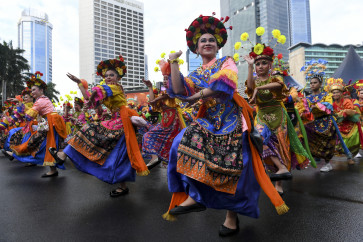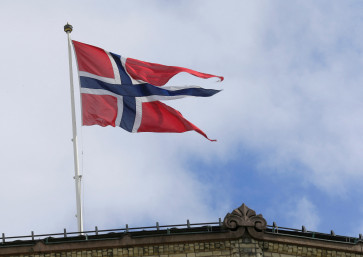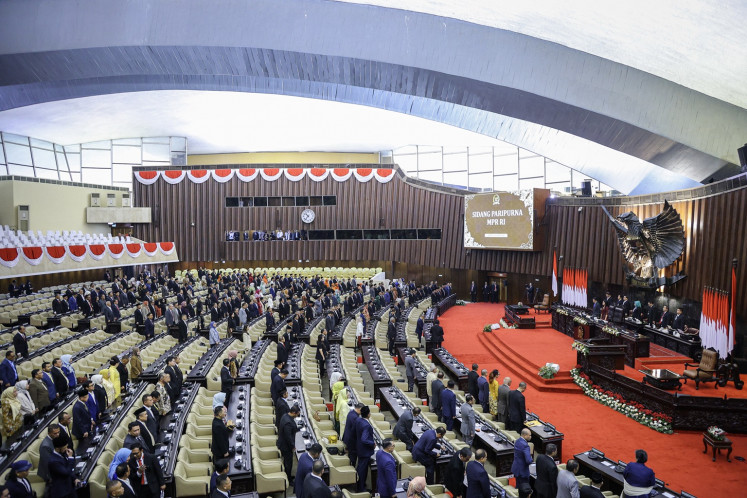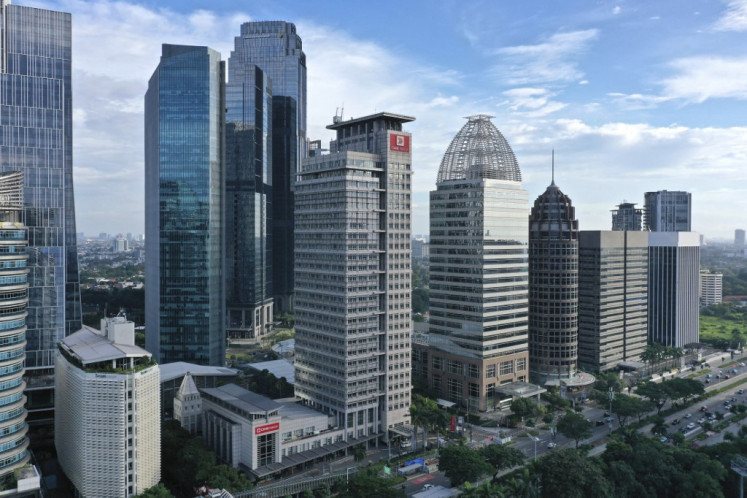Popular Reads
Top Results
Can't find what you're looking for?
View all search resultsPopular Reads
Top Results
Can't find what you're looking for?
View all search resultsJoshua Oppenheimer: Facing the monsters in the dark
Joshua Oppenheimer
Change text size
Gift Premium Articles
to Anyone
Joshua Oppenheimer. Daniel Bergeron
Joshua Oppenheimer was walking down a glacier on Mount Karakoram in Pakistan when he had an epiphany.
It was the mid-1990s. He had been crying while sitting on the top of the glacier, remembering something about his childhood, said Oppenheimer.
When he walked down the black rocks, he realized that recording how humans imagined themselves could help people better understand reality.
He was spending a summer in India that year, working on a street theater project.
Around that time, Oppenheimer had changed his undergraduate major to philosophy from theoretical physics.
As a boy he was interested in the nature of reality and its relationship to consciousness. He said he was amazed as a high school student to learn that subatomic particles only show a fixed nature once we
observe them.
However, when he started at university, quantum physics were not as developed as the science is now and students were geared to become engineers, which Oppenheimer was not interested in.
However, after his moment of clarity on the glacier, he returned to Harvard and crammed three years of film studies in two.
Nearly 20 years after his epiphany, Oppenheimer, 39, has made a film, The Act of Killing, about former death-squad leaders as they re-enact the work during the mass killings following the purported attempted Communist coup in Indonesia in 1965.
The film is favored to win the Academy Award for Best Documentary, which will be handed out Monday morning, or Sunday night in Los Angeles.
The Copenhagen-based American was recently in New York after screening the film at the Library of Congress in Washington.
Beyond racking up a host of awards, The Act of Killing, eight years in the making, has achieved something that no other documents or reports on the genocide have.
It has broken the taboos on speaking about Indonesia's dark past, stirring a national conversation that has been stifled for nearly 50 years by government propaganda and media self-censorship.
Internationally, the film has raised awareness about the killings and the collective role Western governments had in encouraging and ignoring one of the greatest massacres in history.
Oppenheimer himself has become a spokesperson about the genocide as the film gain prominence.
At both the Washington screening and when he accepted a British Academy of Film and Television Arts (BAFTA) award, Oppenheimer said that the Western world had not only ignored the killings: They encouraged it.
He called on the US and the UK to acknowledge their collective role in the genocide. 'I often talk about how The Act of Killing is a film about when killers win and take power.
'But the killers include the Americans, the killers include the CIA officers and the State department officials who gave a list of thousands of names to the Indonesian Army,' he said referring to the 5,000 names of public figures US officials gave to the government.
'It would be hypocritical for example for the US or for me to say the government of Indonesia should apologize without articulating equally forcefully [that] the US should apologize,' he said.
For Oppenheimer, the role of art is to show us 'things that we already know but maybe had been too afraid to acknowledge or too afraid to remember'.
He chose nonfiction cinema to capture 'the rainbow of stories that make up our factual reality', which he said was made up of 'almost innumerable number of fragmentary molecular interacting fantasies, stories, narratives, fictions'.
Non-fiction storytelling, he says, can 'make visible the fiction' behind our perceptions.
'I think there's a false and boring notion of nonfiction film that it's a kind of window onto the world and you look into the window and you see the world,' he said.
Whenever people are filmed they 'present' themselves, according to Oppenheimer. 'We start acting out some of these invisible, second-hand, third rate, half-remembered script or stories that we have of ourselves that we identify
with ' images that we have of ourselves that come from movies and culture and our parents and history.'
Oppenheimer said that filming people as they presented idealized images of themselves, as he did in the reenactments in The Act of Killing, gave a window into people's deepest fears.
'What are they hiding? Why do they have to act like something that they're not? Why do they have to act out an image of themselves. Which is pretend but very real?' he asks.
'Anytime you film anybody, you can see the fictions that people cling to so they can live comfortably withthemselves and you can glimpse behind that ' who they really fear that they are.'
'There are events that we're too afraid to inquire about,' Oppenheimer says. 'But we know [they] lurk there like a kind of monster in the dark.'
Oppenheimer started his work in Indonesia in 2001, three years after the fall of Suharto, to examine the impact of globalization.
He filmed workers in a Belgian plantation in North Sumatra struggling to form a union. Many had family members who had been killed in 1965 or 1966.
When news of the project reached the authorities, the military intimidated the workers to keep silent.
At the suggestion of one of those who survived the genocide, Oppenheimer aimed his lens at the perpetrators.
To his horror, he encountered boastful men who would tell stories of how they killed ' and reenact the deeds using their wives as subjects or in front of bored grandchildren.
Oppenheimer is now editing his next film, The Look of Silence, about a family of survivors of the 1965 violence confronting the killers.
'The Look of Silence is in some ways the film that I set out to make. But it's not. It's really different because making The Act of Killing changed everything and changed me in how I see what's happening,' he said.
The second film Oppenheimer said has turned into 'poem about silence that's born out of fear and the necessity and trauma that comes out by breaking that silence'.
The Look of Silence will be Oppenheimer's last film about the genocide in Indonesia. Conscious of the importance of acknowledging and the crimes of the past, Oppenheimer said that he could be a spokesman for the issue for as long as the film is in the spotlight.
He said there have been many activists and historians who have raised this issue, comparing the people to the truth-speaking child in the fairy tale 'The Emperor's New Clothes'.
'We're trying to create a space where people can talk about and therefore to address their biggest and most frightening problems because if we don't address them we're doomed to continue living in the nightmare.'










